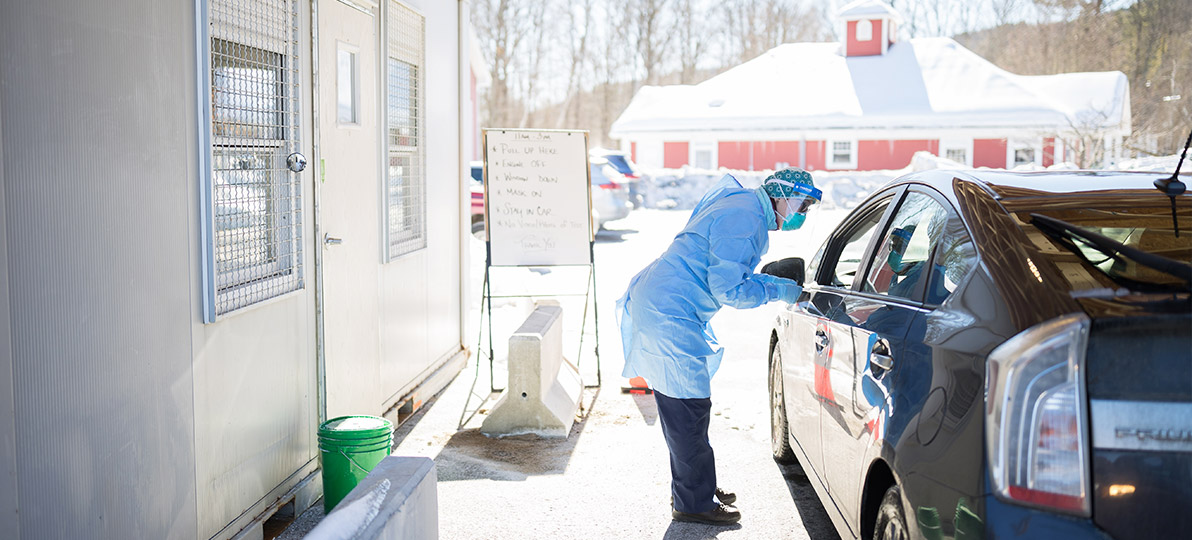
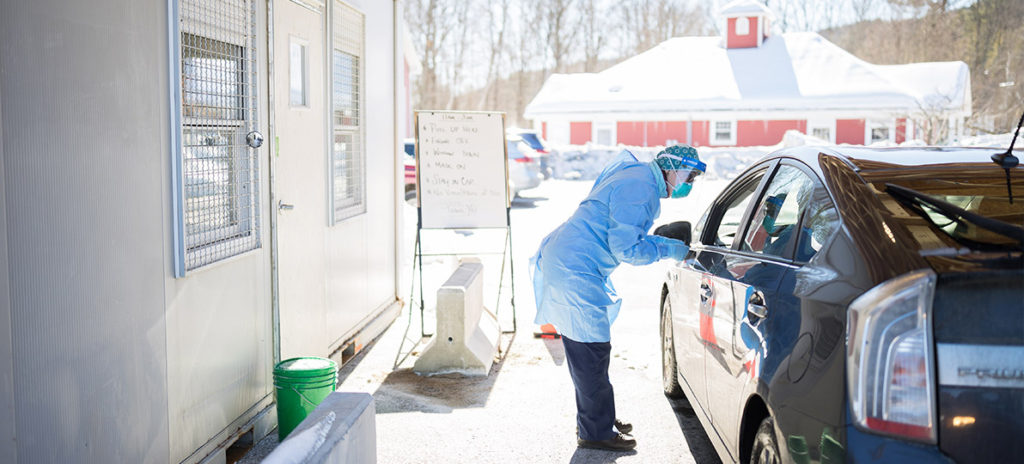
A member of the Gifford team waits for a patient to complete a nasal swab at Gifford’s drive-through COVID testing station. During 2021 Gifford performed nearly 14,000 free COVID tests.
Powering Through COVID
What was uncharted territory for the healthcare industry in 2020 became a busy, crowded landscape in 2021 as Gifford hit its stride in what came to be termed as a “new normal”. By summer, and with the development and distribution of vaccines, some restrictions were beginning to lift and many hoped that the worst of the pandemic was behind them.
This reprieve was short lived as the Delta and Omicron variants would keep COVID very much a part of our lives, sending case counts and hospitalizations higher than ever into the fall and winter months.
Soon the hospital was experiencing its busiest moments since the start of the pandemic. However, the struggles didn’t stop Gifford’s staff from doing everything possible to take care of its community members. Even if that meant longer workdays or shifts they’re not used to taking.
“In many ways, we were doing business as usual,” Emergency Department Clinical Nurse Coordinator, Jamie Cushman said. “Staff dealt with the news as an inevitability. It was something that they expected given the rate at which those in certain age groups received vaccination and the fact the virus had been known to have developed variants.”
Providers and nurses were taking care of very sick patients while enduring staffing shortages. Shortages were already an issue prior to the pandemic, because Cushman says, nursing has become more specialized over the last 10 to 15 years.
“Each area or department has a different way of operating and there’s a unique education that comes with it,” Cushman said. “So it’s not easy to move an ED nurse to the inpatient floor. It’s been a challenge, but people have stepped up to try and meet that challenge.”
But it isn’t just a shortage of nurses causing the longer work hours and changing of shifts. Staff themselves are getting sick or they need to stay home to care for a sick or quarantined family member. This is where Gifford employees have stepped in to help in areas outside of their day-to-day duties.
“That’s the beauty of Gifford. Universally people will ask what they can do if it means getting through the situation faster,” Gifford Vice President of Operations, Rebecca O’Berry said. “I don’t have to ask people to help. I say this is where we’re challenged and then people come.”
O’Berry says several people came out of semi-retirement to help out where they can, including Physician Assistant, Sue Burgos, who helped at the COVID vaccine clinics. Some staff, like Emily Swint PA-C, had to shift jobs so she could make time to distribute the vaccines and boosters. Through the fall and early winter of 2021, Gifford was scheduling about 150 people for each of its half-day COVID vaccine clinics.
Community Relations Coordinator, Katja Evans helped by registering patients in the COVID vaccine clinic and performed clinical and administrative work for drive-through testing. “I’m always really eager to help where help is needed and I felt that assisting with COVID work was where I could be most useful,” Evans said.
Some staff members helped ease the concerns of community members through the hundreds of phone calls received through our dedicated COVID phone line. “I’m a believer in the touch,” O’Berry said. “I believe it’s really important that people have a chance to ask questions. Phone calls are critical to success. Part of it is education and another opportunity to talk through things like quarantine.”
Oftentimes, a phone call to announce a negative test, results in a great deal of relief from the person on the other end of the line. However, there are instances where people are still concerned even after receiving a negative result, because they say they don’t feel well or haven’t improved.
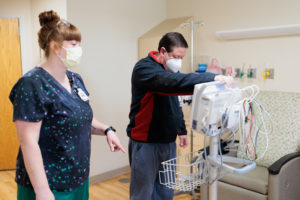
Gifford provided 100 monoclonal antibody treatments in 2021, helping many affected by COVID to recover faster. Leigh Holliday, LPN, and William Turinetti, LNA, work together to set up for upcoming treatments.
“They’re looking for answers and guidance,” O’Berry said. “People with positive test results have fewer questions and they’re mostly about policies. Work is telling them one thing, so they’re asking if they should go by that or what I’m telling them.’”
The phone calls don’t stop on the weekends or holidays. The Gifford staff is not only making the test result phone calls, some members, including Evans are taking breaks out of their busy schedules to help book testing appointments, relieving some of the pressure on the Patient Registration team.
“I know the staff is working hard to get through this and it’s nice to be able to step in to provide some relief to those teams that have been taking on a lot of COVID-related work,” Evans said.
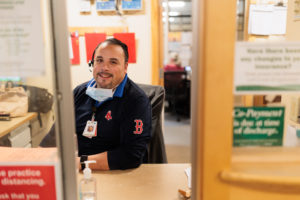
Marcelo Reyes, who works in Patient Registration, is one of many members of the Gifford team to step up and assist at our COVID drive-through testing station.
“I’m proud of how steadfast our group has been in the face of almost endless adversity,” Gifford Chief Medical Officer, Dr. Josh White said. “Their problem-solving skills and willingness to meet the challenge head-on is incredible.”
The challenge moving forward for Gifford and its staff is how to keep up morale in such a time of distress.
“This year, more than any other, there have been days when folks have not wanted to be here. Days when their giving spirit felt broken,” Cushman said. “Some have found that just being here amongst their peer group has helped them get to a better place emotionally while others have needed a little extra scheduled time off and that has worked out too.“
“The beauty of Gifford is the way we do pull together and support each other,” O’Berry said. “People genuinely care about their colleagues. Sure there are times when staff are tired and think they have reached their limit, but it’s during those darkest times when they show their amazing resiliency.”
One of the keys to preventing COVID outbreaks in schools and keeping staff at work, is by vaccinating children. Gifford played a major role in this process once the FDA approved the Pfizer vaccine for children ages 5-11 in October.“Our pediatricians here are strong proponents of child vaccinations,” Gifford Vice President of Operations, Rebecca O’Berry said. “So, I feel like there was no question we were going to be a part of this.”At first, Gifford staff was planning to distribute vaccines for children aged 5 to 11 directly in the schools, working with the various school nurses as was the case earlier in the fall when vaccines were available for children aged 12-15. However, it was determined that visiting the schools would not be an option. As the plan shifted. Gifford created additional times for people to come to the medical center for their child’s vaccine.“What I love is when the child is sitting in the room, they look around and see the other children. I hear the parent tell the child that those children are also getting vaccinated. You can then see the comfort on the child’s face,” O’Berry said.Monoclonal Antibodies
One intervention that Gifford was able to provide its high-risk patients was monoclonal antibody treatments. While of great benefit to patients, this treatment created some logistical challenges for hospital staff. According to Gifford Chief Medical Officer, Dr. Josh White, a nurse has to be dedicated to a patient for a minimum of three hours in full PPE to provide monoclonal antibody treatment.The treatment needs a very rapid response, so it requires a lot of volunteer activity amongst the Gifford staff to get it done quickly and at odd hours. “
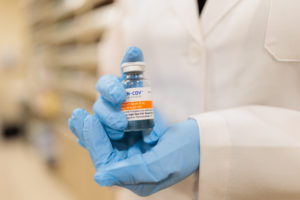
A vile of the Monoclonal Antibody Treatment held by a member of Gifford’s Pharmacy staff.
They are very difficult to provide, from a logistical standpoint,” Dr. White said. “However, the data on them was clear from the beginning that they were very effective and we felt the data couldn’t be ignored. Thus, we were very early implementers, relative to the rest of the State.”
Dr. White, who has played an important role in educating the community during the pandemic, actively researches the virus, its effects, and new treatments. Gifford’s ability to distribute this treatment to older and sicker COVID patients, dramatically improves a patient’s condition, potentially cutting the number of daily hospitalizations.
“These are life-saving medications and they help people. If we can provide this med and keep a patient out of the hospital, it helps us on the back end from the capacity standpoint,” Dr. White said.
New Faces
In a year when staffing shortages plagued hospitals around the country, Gifford was fortunate enough to welcome some new providers to our family this year, including a couple of familiar faces:
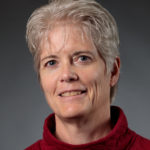 Family Nurse Practioner
Family Nurse Practioner
Eileen Murphy, MSN APRN
Eileen returned to Gifford in the spring and is seeing patients at the Chelsea Health Center and the Rochester Health Center. She originally joined Gifford in 1998 and worked at the Bethel Health Center until 2008. She came back to Gifford after working at the VA Medical Center in White River Junction. She has worked as a nurse practitioner for over 20 years, providing broad-spectrum primary care for patients of all ages in rural Vermont. “My goal is to collaborate with patients and families to address their health care needs and together, work toward their goals.”
 Emergency Department
Emergency Department
Oliver Barnyak, MD
Dr. Barnyak was very excited to join the Gifford Emergency Department. Point of care ultrasound and delivering palliative care from within Emergency Medicine are Dr. Barnyak’s passions. There’s a variety of patients who come through the emergency room doors, which is what first peaked his interest in emergency medicine. “It is still my favorite aspect of medicine and no where gives you more of that than a small, rural ED.”
Pain Medicine
Nathaniel “Nat” Harlow, DO
Dr. Harlow returns to Gifford after a year-long Pain Medicine Fellowship at Dartmouth-Hitchcock Medical Center. He’s available one day a week for clinic and one day a week for procedures. Dr. Harlow takes a comprehensive approach with each patient, coming up with a multi-disciplinary treatment plan focusing on non-opioid therapy for chronic pain. “This is my hometown hospital. There’s a large emphasis on community and family at Gifford and a dedication to the underserved population.”
 Pediatric Medicine
Pediatric Medicine
Courtney Riley, MD
The Gifford Pediatric team welcomed back Dr. Riley over the summer. Dr. Riley, who took six months away, originally joined Gifford in 2016. She advocates for her patients on a variety of topics including: cyberbullying, HPV vaccinations, and routine lipid profile screening as well as screening for risk factors for genetic heart disease. “I love to work with patients of all ages and stages! The patient is my priority and I try to engage them directly as much as possible.”
 Nurse Practioner
Nurse Practioner
Susan Thievon, MS, APRN, FNP-BC
Gifford’s Bethel Clinic welcomed primary care Nurse Practitioner Susan Thievon in August. “I really love the variety of the family practice. In my years of experience, I’ve taken care of multi-generational families and it’s just a really neat experience to have those connections with families. We can’t fix everything, but what I can do with that person or family to make them engaged in their healthcare is important.”
 Behavioral Health Counselor
Behavioral Health Counselor
Gretchen Hoyum, MS MFT
Gretchen Hoyum joined the Counseling and Psychiatry team in Randolph over the summer, coming from Seattle, Washington where she received her special master’s in marriage and family therapy at Seattle Pacific University. “I really love doing relational work, helping people communicate better with each other and be more authentic in their relationships. Sometimes people just need a translator.”


